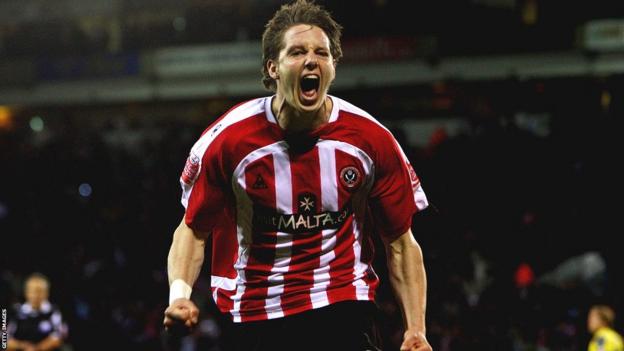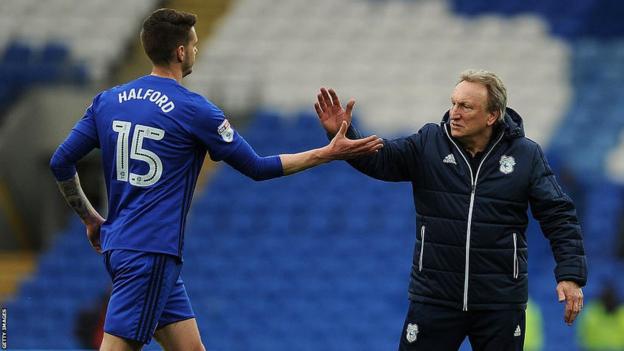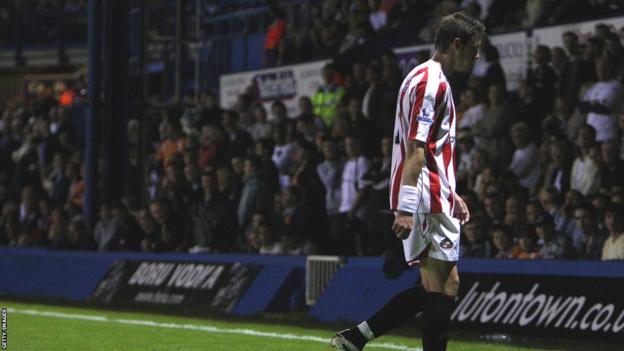Sports
Greg Halford: The diagnosis that changed it all for a Premier League player



Sign up for notifications to Insight features via the BBC Sport app and read the latest in the series here.
Colchester United, Nottingham Forest, Wolves, Cardiff, England Under-20s.
Right-back, central midfielder, winger, striker.
Greg Halford has appeared for 20 teams in his career and played in nearly every position on the pitch.
His boyhood obsession for the game led to him turning professional. But, in some ways, that was the easy bit; finding his place in football became the ultimate challenge.

During Halford’s 18-month stint with Rotherham between 2015 and 2017, his son was diagnosed as autistic.
Many autistic people see themselves not as disabled but differently wired, with different behavioural traits to the majority.
“My son was diagnosed when he was six years old,” says Halford.
“It got me thinking. I was exactly the same as him at that age, so I wanted to go and discover who I really was and that’s what I did.
“I always knew I was different. I just didn’t know how or why. But I’m glad this has happened and I can only say thank you to my son for that.”
It was at his next club – a Cardiff side chasing promotion from the Championship – that Halford shared his own autistic diagnosis with manager Neil Warnock and captain Sean Morrison.
“It was a relief,” Halford says. “I knew Neil would be fine with it and he wouldn’t treat me any differently and he didn’t. We had a relationship for two and a half years and that didn’t affect anything.
“When it came to Sean, the captain, I felt comfortable because we spent a lot of time together in and out of football and he was the type of person that I could trust if I wanted him to keep it to himself.
“It was nice that I was able to finally open up about something that was so close to me and there wouldn’t be any consequences towards it.
“That’s ideally what I wanted in the first place. Even if I did know earlier in my career, I wouldn’t have told anyone.”
To his relief, Halford got his timing right. The 39-year-old has received widespread support since disclosing his neurotype and seems happier than ever.

Halford started his career at Colchester in the early 2000s, rising through the youth academy to help the first team get promoted to the Championship.
During a five-year spell close to his hometown of Chelmsford, Halford found the structure and routine autistic people love.
His Premier League break came at Reading, becoming their record signing in January 2007.
However, a first transfer was always going to be tricky.
“It was the first move to Reading where I’d finish training and I’d literally go home after that – I didn’t want to go into the cafeteria, I didn’t want to have lunch, I didn’t want to chat with people,” Halford remembers.
“Ultimately that was the reason I was sold from Reading because they told me that I didn’t fit in personality wise, which was tough. But it was something that I learned from.”
Reading’s then director of football Nicky Hammond said at the time that Halford hadn’t made the impact he and the club would have liked and that “players do move on quite quickly if it’s felt that the fit isn’t quite right”.
“This is absolutely no reflection on Greg as a person or a player and he has been a very good professional during his short time with us,” Hammond added.
Determined to improve his social skills at new club Sunderland, Halford pushed himself out of his comfort zone.
“I made a conscious effort to go into the cafeteria after training, try and sit down and have conversations with people,” he says.
“I had a bit of anxiety with it, but it built me as a person.
“I’ve always said any mistakes I make are what I want to do to grow as a person.”
Perhaps the biggest of those mistakes came in Halford’s first meeting with his new manager, Roy Keane. Halford was told by his agent to ask Keane which other players might be coming to the Stadium of Light during the transfer window.
Halford posed the question. Keane didn’t take kindly to it.
“I didn’t like the way he sat down,” Keane wrote of Halford in his 2014 autobiography.
“He was crouched. I didn’t like him after that. I thought, ‘Not for me.'”
After just nine games, Halford was heading to Charlton on loan.
During his career, Halford played at almost all the big grounds; Wembley, the Emirates, Old Trafford, Stamford Bridge, the Etihad – the only atmosphere he missed out on was the ferocity of Anfield.
At each new club, it was during away trips that he would invariably be faced with an initiation.
What would Greg be singing, his new team-mates would ponder.
“We’d be in a hotel, we would go down for dinner and that’s when it would happen,” he says.
“It wasn’t just the players and the staff that were there, it would be the staff of the hotel, who were serving us dinner and stuff.
“These were people that I knew even less, from outside of the football world, which made it difficult. It was the anticipation; I’d get the shakes.
“Obviously the more times I paid the fine [instead of singing an initiation song], the easier it became. I didn’t want to be one of those people that just came into a new club and dismissed the traditions of being part of the changing room, but it was something that I felt I had to do.
“As for people’s reactions, nothing was really said to my face. Players were probably a bit more stand-offish at the beginning.”
Despite challenges off the field, Halford made 28 appearances in the Premier League and 318 appearances in England’s second tier.
In 2009, a trademark Halford header took Sheffield United to the Championship play-off final, where his side were beaten Burnley at Wembley.
His final Championship season was as part of the Cardiff squad that clinched promotion to the Premier League in 2018.
“Cardiff was the icing on the cake,” Halford says.
“Everyone from the chefs to the manager, to the players, to the fans – it had everything that you could ever want for a job, and obviously to top that off, we got promoted.”
It was while with the Bluebirds that Halford discovered he, like his son, had a different neurological operating system from most.

Despite the late diagnosis, Halford has no regrets looking back on his career.
He believes constant change, new environments and new people have made him as versatile off the pitch as he is on it.
“It was a chance for me to be able to grow and understand how people tick,” he says.
“Maybe the one thing that I may have changed would have been to become part of little cliques, so I would have been able to go and hang out with two or three people outside of the changing room walls and been able to discuss things a bit more in depth in terms of personal life and stuff like that.
“When it comes to the general atmosphere and the situations that football has put me in, I wouldn’t change anything.”
These days, you’ll find Halford’s towering presence at Hashtag United of the Isthmian League Premier Division – a team fuelled by social media following.
He is also considering a move into coaching.
Halford has become the third player to talk of life being autistic in the Premier League – after former Manchester United right-back John O’Kane and ex-Republic of Ireland international James McClean, now of Wrexham.
McClean and Halford’s stories are representative of so many people in the United Kingdom who discover they are neurodivergent following a similar revelation about their child.
The ADHD (Attention deficit hyperactivity disorder) Foundation says one in five people are neurodivergent – part of a neurological minority.
This includes those who are autistic, dyslexic, dyspraxic or living with ADHD or in another way neurodivergent.
While Halford is planning to step up advocacy work, teaming up with Neurodiverse Sport’s Caragh McMurtry, he’s not going to be consciously raising the subject in the changing room.
“It’s not something that I bring up,” he says.
“If someone wants to talk to me about it, I’m more than open to talk about it.
“There aren’t too many questions about it. Again, we’re in the football industry and the majority of the questions that I get asked are about football and my experiences with certain teams or positions or maybe managers.”
Physical fitness has always been the focus of dressing-room discussions, but Halford says, at the start of his career, mental fitness was never considered.
“It was the norm. You got a physical injury and you would get treated. Now I do find it odd not thinking about both my physical and mental health,” he says.
“You have to be mentally right to compete at any level. I’m finding that now, even with all my experience. If I’m not mentally right going into games, you get found out very quickly. It’s just as important, if not more so.”
Halford is desperate to improve perceptions of those who think differently, and, just like McClean, is determined to be an inspiring role model for his family.
He would like to see his sport’s priorities to be similarly social, rather than financial.
“Football is based on money and the players are the commodities,” he says. “Until football stops being a business and is run for human beings I can’t really see it changing too much.”
Despite his frustrations, he aims to change the game “from the inside”.
After lots of transfers, lots of new houses and lots of new managers, Halford is now part of one of football’s most exclusive clubs – one of the sport’s rare neurodivergent advocates.
Previously in Insight
Sports
Park's 'brilliant' solo goal gives GB lead against Spain

Watch as Team GB’s Nick Park gets their Paris 2024 men’s hockey campaign off to the perfect start with a brilliant solo goal against Spain.
Source link
Sports
Pep Guardiola: Manchester City boss could stay beyond 2024-25 season

Pep Guardiola says he could stay at Manchester City beyond the end of the season.
Manager Guardiola’s contract expires at the end of the coming campaign.
In the aftermath of City’s historic fourth successive Premier League title success, Guardiola raised doubts over his own future when he said he was “closer to leaving than staying”.
The Spaniard has been in charge of City for eight seasons and has won the league on six occasions, part of an overall 17-trophy haul.
Speaking to reporters in New York ahead of City’s pre-season encounter with AC Milan at Yankee Stadium on Saturday, Guardiola said nothing had been decided.
“I didn’t say I was leaving,” he said.
“Nine years at the same club is an eternity. I don’t rule out extending the contract. I want to be sure it is the right decision for the club and the players.
“When I decide, I will talk with my CEO and sporting director. But I want to start the season, and look at how everything is going and how connected we are. After, we will see.”
Guardiola said he hopes to be in charge for the expanded 32-team Club World Cup, to be held in the United States next summer, but was not sure about the tournament itself, which is at the centre of a dispute between world governing body Fifa and the major players’ unions.
City could end up playing 75 matches across the season, starting with the Community Shield with Manchester United at Wembley on 10 August and potentially ending in the Club World Cup final in the United States on 13 July.
Striker Erling Haaland says it is impossible for any player to be fresh for so many matches.
“It is difficult to be sharp if you play 70 games a year,” Haaland said.
“You could see at the Euros how tired people will be. Some will get a lot of vacation. You have to work with the people around you to be the best version of yourself.”
Not that Guardiola seemed to have much sympathy for the Norwegian.
Guardiola allowed the City players involved in the Copa America and Euro 2024 latter stages to choose when they returned to pre-season training because he did not want them coming back exhausted.
Norway, for whom Haaland plays, failed to qualify for the Euros.
“Has to rest more,” said Guardiola of Haaland. “If he is tired, go to bed early. Tired is an excuse.”
Sports
Paris 2024 Olympic opening ceremony kicks off Games in unique style

The 2024 Olympics opened in Paris in spectacular style with thousands of athletes sailing along the River Seine past lively performers on bridges, banks and rooftops in an ambitious take on an opening ceremony.
Swapping a stadium for a waterway for the first time to open the “greatest show on Earth”, the near four-hour spectacle culminated in French judo great Teddy Riner and sprinter Marie-Jose Perec lighting a cauldron shaped like a hot air balloon that rose high into the Parisian sky.
Blue, white and red fireworks had raised the Tricolore above Austerlitz Bridge before 6,800 athletes from 205 delegations travelled on 85 boats and barges past some of the French capital’s most famous landmarks.
There were surprise performances through the ceremony, including a cabaret number from US singer-songwriter Lady Gaga, as well as an emotional return of Canadian icon Celine Dion.
The day had started with major disruption when the French train network was hit by arson attacks and heavy rain in the evening put paid to the original plan by artistic director Thomas Jolly to use the Parisian sun to “make the water sparkle”.
The lashing rain may have forced athletes to add rain ponchos and umbrellas to their planned outfits but it did not detract from the lively journey through French history, art and sport told by some 2,000 musicians, dancers and other artists.
The last two boats to parade – first the US as the next hosts for Los Angeles 2028 and then France – had the largest numbers of athletes on board, while other barges carried several delegations together.
Rower Helen Glover and diver Tom Daley were Great Britain’s flagbearers in Paris, which is hosting the summer Games for a third time and the first time in 100 years.
In opening the 33rd summer Olympics, which are taking part against a difficult international and domestic political backdrop, International Olympic Committee (IOC) president Thomas Bach told athletes they were now “part of an event that unites the world in peace”.
More than 10,500 athletes will compete across 32 sports at the Games, which will close on 11 August.
-

 African History5 years ago
African History5 years agoA Closer Look: Afro-Mexicans 🇲🇽
-

 African History6 months ago
African History6 months agoBlack History Facts I had to Learn on My Own pt.6 📜
-

 African History5 years ago
African History5 years agoA Closer Look: Afro-Mexicans 🇲🇽
-

 African History1 year ago
African History1 year agoMajor African Tribes taken away during the Atlantic Slave Trade🌍 #slavetrade #africanamericanhistory
-

 African History1 year ago
African History1 year agoCameroon 🇨🇲 World Cup History (1962-2022) #football #realmadrid #shorts
-

 African History6 months ago
African History6 months agoBlack History Inventors: Mary Kenner 🩸
-

 African History1 year ago
African History1 year agoNo African pre-Columbus DNA? 🤯🤯 #history #mesoamerica #mexico #african
-

 African History1 year ago
African History1 year agoOrigin Of ‘Cameroon’ 🇨🇲😳#africa
























